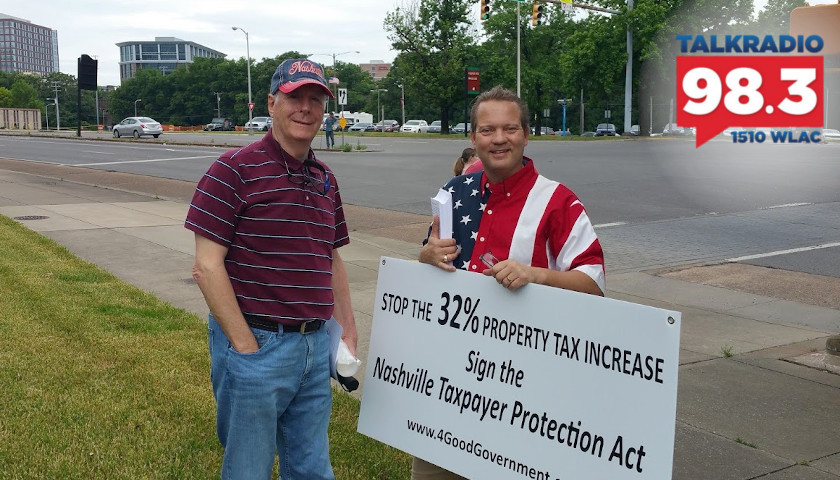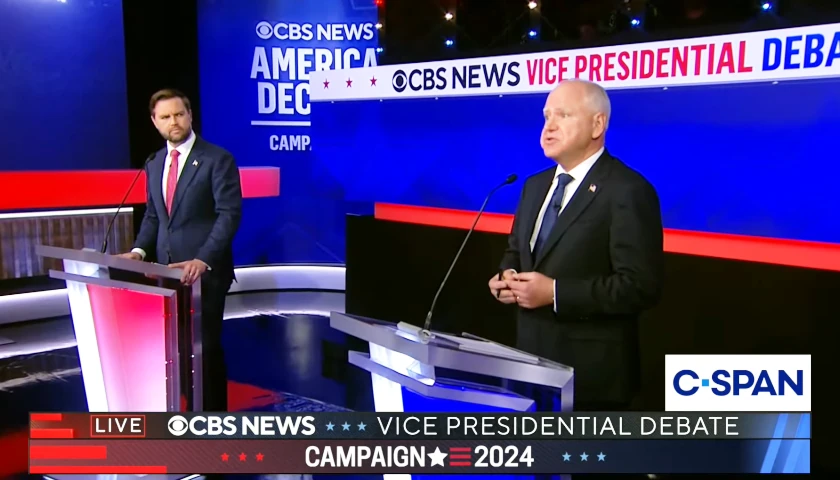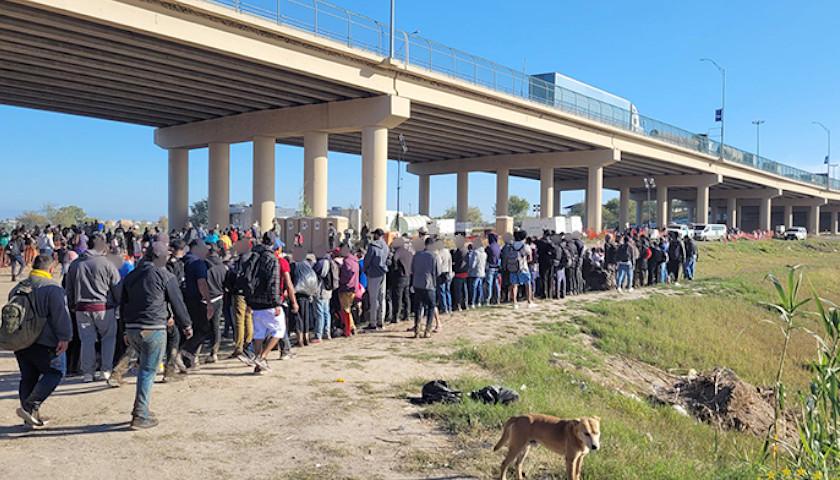Live from Music Row Friday morning on The Tennessee Star Report with Michael Patrick Leahy – broadcast on Nashville’s Talk Radio 98.3 and 1510 WLAC weekdays from 5:00 a.m. to 8:00 a.m. – host Leahy welcomed attorney Jim Roberts to the newsmakers line.
During the third hour, Roberts described the Nashville Taxpayer Protection Act and gave directions on how to download and sign the petition which would but a referendum on the Metro government to stop non-core spending without a vote. Also, Roberts gave a brief rundown on the Nashville Fairground’s current lawsuit.
Leahy: On the newsmaker line our good friend attorney Jim Roberts. Welcome, Jim.
Roberts: Good morning to you!
Leahy: So you’ve got a new project. We’ll talk about the fairgrounds in a bit. Let’s talk about this lowtax4nash.com and what you’re working on in terms of getting signatures on a petition and what you want to accomplish.
Roberts: Let me clear, there are actually several groups working on this. The Low Tax 4 Nash is actually a smaller group of good folks that have latched on to this. It is restaurant owners and people with businesses here in Nashville that came to me and said, what are we going to do with this 32% tax increase. It’s going to devastate businesses that are already devastated and prevent us from recovering. I came up with this idea and it just sort of got moving. We came up with the Nashville Taxpayer Protection Act.
Leahy: If people want to go to the web and see the Nashville Taxpayer Protection Act, where do they go?
Roberts: It’s www.nashvilletaxpayerprotectionact.com and it will take you right there.
Leahy: nashvilletaxpayerprotectionact.com.
Roberts: Yes sir.
Leahy: So when we get there Jim, what do we do? What do we see and what are we trying to accomplish?
Roberts: You have to have original signatures. What we are trying to do is put a ballot initiative that will cap the property tax rate at no more than two percent a year. We have to gather signatures. I’ll ask your listeners to download it, sign it and mail it into us and we’ll turn those signatures into the Metro Nashville government.
Leahy: How long do you have to get those petitions together?
Roberts: We’re going to turn the signatures in about the first week of August. We have basically the next two months to gather signatures.
Carmichael: How many?
Roberts: About 7,000-8,000 signatures. Which is not too many. If everybody in town picks up a petition and gets 10 signatures we only need 700 people to do that. We’ve got thousands of petitions floating around now but we need more.
Carmichael: I want to be sure I understand the mechanism, and I want to compare it to a previous one. It is my understanding which is obviously false that the voters by 10-15 years ago voted on a referendum that was on the ballot that limited the increase on property taxes unless the rate came back to the voters. Am I wrong about that?
Roberts: There was a ballot initiative that did that and the problem is that our tax system is really based on two different numbers. It’s the appraised value for people’s property and the tax rate itself. When the appraised values go up the tax rate goes down. It has to be revenue-neutral.
What has happened in the past with inflation has just let property tax levels by issuing bonds. This will let them actually raise property taxes a little bit each year just to track inflation so we won’t have these emergency situations. The ballot initiative that was before just didn’t solve that problem.
Leahy: Ok. So it was kind of a sledgehammer to hammer in a nail?
Roberts: Well, that’s right. Making the tax revenue-neutral is sort of a good idea. You have to be able to raise them with inflation. The reality is that things are getting more expensive and Nashville’s taxes should follow along with that. Raising it 32 percent is ridiculous.
Carmichael: Here’s a question for you Jim. The revenues for Nashville because our economies been have been strong before COVID revenues have been going up at four to five percent a year.
Roberts: That’s right because we have been growing.
Carmichael: So what you’re saying is that had the council been allowed to increase the property tax rate by two percent a year during that same period revenues would have grown at seven or eight percent a year.
Roberts: Of course, the problem is not the revenue side its the spending side.
Carmichael: And I very much appreciate what you are doing. Is there a way to get a referendum signed by the voters that limits spending? In other words, what your referendum is doing and I applaud it and I will print it out and sign it.
It’s on the revenue side, can the voter’s sign some kind of a referendum that requires the government to solve certain problems by dictating to the government. For example, can it say that there will be no more than one non-teacher in the school system for every four teachers? Because right now it’s one to one.
Roberts: First of all, we can do, as the people, anything. We have the power to abolish the Metro government by referendum. We can do one today and abolish it in three or five months. So we can do anything. This Taxpayer Protection Act doesn’t just limit the property tax. Please read further into it because one of the things that we’ve been doing is just issuing bonds every time we want to do something.
The Metro Council has just been using the Metro credit card so to speak to spend and spend and spend. That’s why we $3.6 billion in debt. They took that money that we were making when times were good, instead of using the pay as we go they used it as leverage to spend more than we have to run up a bunch of debt.
We couldn’t solve all the problems. But one of the things that this Taxpayer Protection Act does is limit their ability to issue bonds for non-core things. If the government wants to build schools, we understand that. Police stations and fire stations.
Those are core government functions. But if they want to build soccer stadiums and transit systems and things like that then they need to put those ballot bonds to the voters to vote on. The people should decide whether we want to spend money on ego projects because the council is doing those things without our knowledge. And we need to make them stop that.
Leahy: Let me follow the timeline. People go to nashvilletaxpayerprotectionact.com. They download the petition, sign it, and mail it in. You get 8,000 of those by the end of July and what happens next?
Roberts: We turn those in the Metro clerk about the first week of August. The number of signatures required is based on the number of people who voted in the last election.
Leahy: Let’s say you hit that number of 8,000 or so.
Roberts: And August 6 should be a fairly low turnout election. We’ll turn them in on August 7. The petition then has to be set on a voting day 80 days out. If for some complicated reasons we can’t do it on the November election date so we set it for December 6. We wanted this to be heard before this 32 percent increase was inflicted on the people. And that would be January 1.
Leahy: There will be an election on December 6 and what would specifically be on the ballot?
Roberts: That’s right.
Carmichael: That one thing.
Roberts: The goal is December 6.
Carmichael: When you say the December 6 ballot, would that be an election that would have exactly one thing on the ballot?
Roberts: Correct.
Leahy: Tell me exactly what it would say.
Roberts: It’s a lot longer but basically it does five things. The entire act itself is one single amendment. So the people will be able to go in and vote on whether or not you want to not have this 32% tax increase and limit the government in these ways that will prevent them from spending in the future. Some of those other things that you want done, we’ll do in future years. We’re just trying to get what we can done now.
Leahy: So in essence its a referendum on the 32% property tax increase.
Roberts: I think it would be perceived that way. Starting January 1 of this year, they are not going to be able to raise our property taxes more than two percent a year without submitting it to the voters. Remember if you were here in 1996 when they wanted to build a stadium for the Titans they went to the people and said hey, we want to spend $2 million to build a stadium what do you all think about that? And the people voted for it.
Leahy: It passed 54 to 46 if I recall.
Roberts: Yes. They wanted it. I voted against it but I knew it was going to win. That’s what people wanted to do and they did it. The same thing should happen every time. Every time the government wants to spend on some big ego project they should submit it to the people and see if they want it and not just shove it down our throats.
Carmichael: Give us an update on the fairgrounds.
Roberts: The fairgrounds are a great example of that. They are giving away a third of the fairgrounds property for free and just shoving it down Nashville’s throat.
Carmichael: Is the lawsuit still going on?
Roberts: There are actually two trials. One set in the next two weeks over some notice issues which is a side issue. But the main trial about how the damage that’s being done to the fairgrounds is in August of this year. Ironically right after we turn in these signatures that case will go to trial.
Leahy: Jim Roberts with nashvilletaxpayerprotectionact.com. Thanks for joining us. Come back and give us an update.
Roberts: I will.
Listen to the full third hour here:
– – –
Tune in weekdays from 5:00 – 8:00 a.m. to the Tennessee Star Report with Michael Patrick Leahy on Talk Radio 98.3 FM WLAC 1510. Listen online at iHeart Radio.





